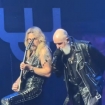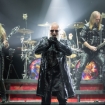It's a Wednesday afternoon in late October, and Rob Halford is seated onstage in the concert hall at Musicians Institute in Hollywood, California. Forgoing his usual leather-and-chains ensemble for a black T-shirt and shorts, the legendary metal god and Judas Priest vocalist spends the next hour offering songwriting advice and anecdotes from his storied career to the aspiring young musicians assembled in the hall before taking questions from the audience. "Writing music is like trying to catch lightning in a bottle," he says. "You never know what's going to happen."
Here's some of what we learned from — and about — one of heavy metal's all-time masters, including some insight into Priest's forthcoming album, Firepower.
Don't Be Afraid to Dissect a Song
While Halford says that Priest generally keep the traditional verse/chorus/verse/chorus/bridge song structure in mind as a basic template to work from, "It's best to keep things as free and open as you can," he adds. "It's good to have a template, but then you go back and dissect it and see where you can make improvements. That's pretty much been the case with every Priest song that's ever been written."
You Can't Predict How Long It Will Take to Write a Song
Incredibly, Halford says that the 1980 Priest classic "Breaking the Law" was written in "about five minutes." Conversely, putting together 1990's "Painkiller" was a laborious process. "Some songs are dead easy, and others can be quite challenging. Other times you just have to put it in the bin. You'll come up with an idea one day and the next day you'll realize it was a pile of shit."
Three Heads Are Better Than One
Various members of Priest used to write songs separately, but Halford says the band's best material has always been created when he and the two guitarists work together — whether it was Glenn Tipton and K.K. Downing back in the day or Tipton and Richie Faulkner on Priest's forthcoming album, Firepower. "Chemistry is important when you're a writing team," he offers. "As a singer, my motivation is the riffs. You'll get the best of out of me when I'm with Glenn and Richard."
Trust Your Training — and Maybe Skip the Vocal Warm-ups
Though Halford has one of the most distinctive and sky-scraping vocal ranges in heavy metal, he doesn't warm up before shows. "We'll be backstage before the gig, and Glenn will be practicing," he says. "Richie will be practicing. [Bassist] Ian [Hill] will be practicing. But I'll be clicking away on my phone and having a cup of tea. When you get up there, you just hope your brain tells your voice the right thing to do."
Embrace Technology
Back in the Eighties, the members of Priest obviously didn't have iPhones to record riffs or lyric ideas into. Still, they took advantage of the cutting-edge technology of the day. Halford cites the band's use of guitar synthesizers on their divisive 1986 album, Turbo. "That sound that you hear at the beginning of 'Turbo Lover' or 'Out In the Cold' just gives it a special embellishment that enhances the music," he offers. "You shouldn't be afraid to do that."
Write Whenever — and Wherever — Inspiration Hits
While recording Firepower, Halford had an hour-long drive to the studio each day. His fellow commuters would often see him screaming an idea for a vocal line into his iPhone. "I got a lot of weird looks from other drivers on the motorway," Halford recalls with a laugh. "Like, 'Is that Rob Halford? Why is he yelling?'"
Find a Good Producer — and Get Cozy With Them
For Firepower, Halford and his bandmates worked with three producers — Andy Sneap, longtime collaborator Tom Allom and Black Sabbath engineer Mike Exeter. "Making a record is an intimate experience," Halford observes. "A good producer can get things out of you that you can't get out of yourself."
Look for Inspiration in Every Genre — and Listen to Frank Sinatra
"I love early blues like Bessie Smith, Muddy Waters and Howlin' Wolf," he explains. "I listened to the way these people sang, and it was just beautiful — straight from the soul. That, for me, was an inspiration. Another one is Sinatra — the way he sings is extraordinary. The way he does 'It Was a Very Good Year,' is fantastic. The way he phrases it, the emotion he puts into it, is very inspiring."
Democracy Is Key
"Try everything and then make a decision collectively with your bandmates," Halford advises. "All the material on Firepower is the result of everyone agreeing on it. You can't move forward with a song that only two or three of you agree upon."
Long Walks Can Cure Writer's Block
"I love my walks," Halford enthuses. "We were recording Firepower out at Glenn's studio, which is in this beautiful place in the countryside, and I'd be trying to find a melody. Glenn would say, 'Have you got anything yet?' And I'd have nothing. Another hour would pass, and I still wouldn't have a thing. So I'd go have a walk. It's the simplest form of exercise and it's the most amazing way to clear your mind, especially if there are no distractions. Then again, you could walk up Hollywood Boulevard and the greatest song in your life could come to you."












